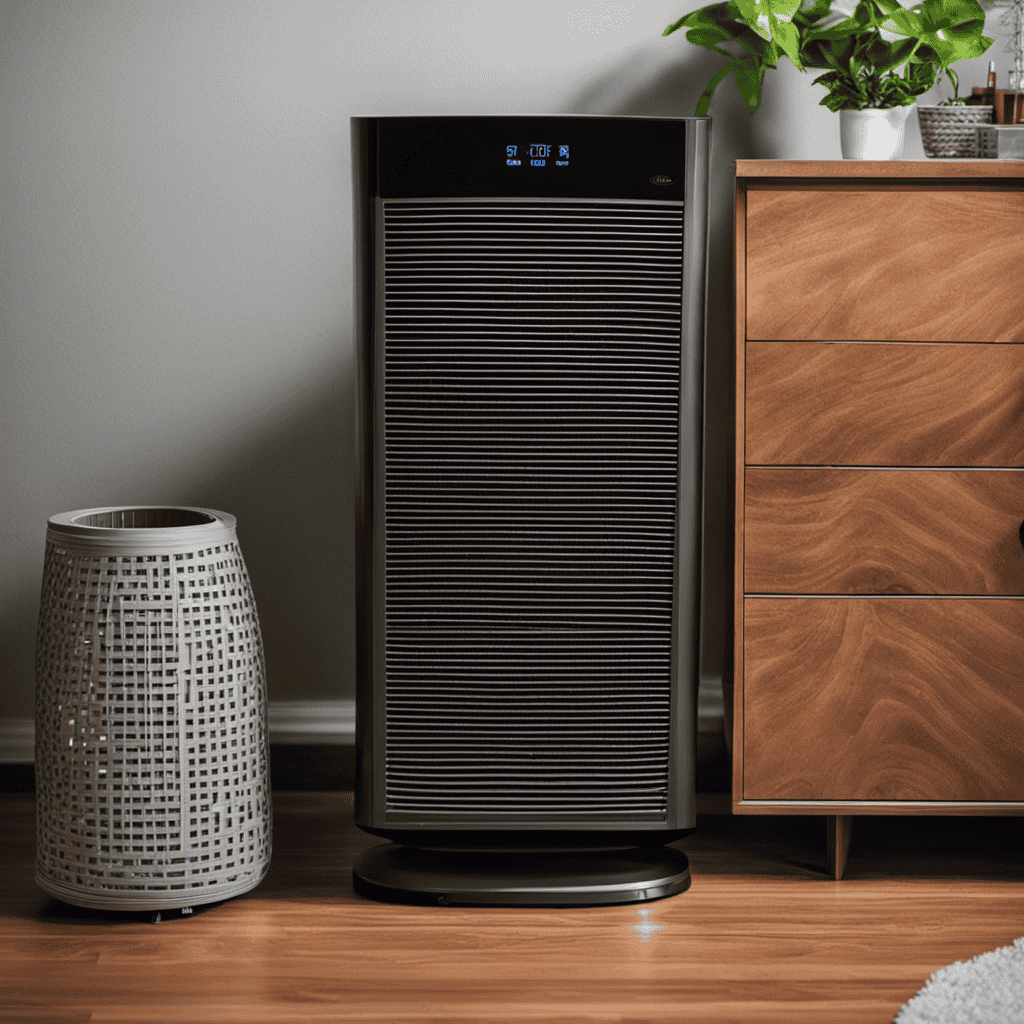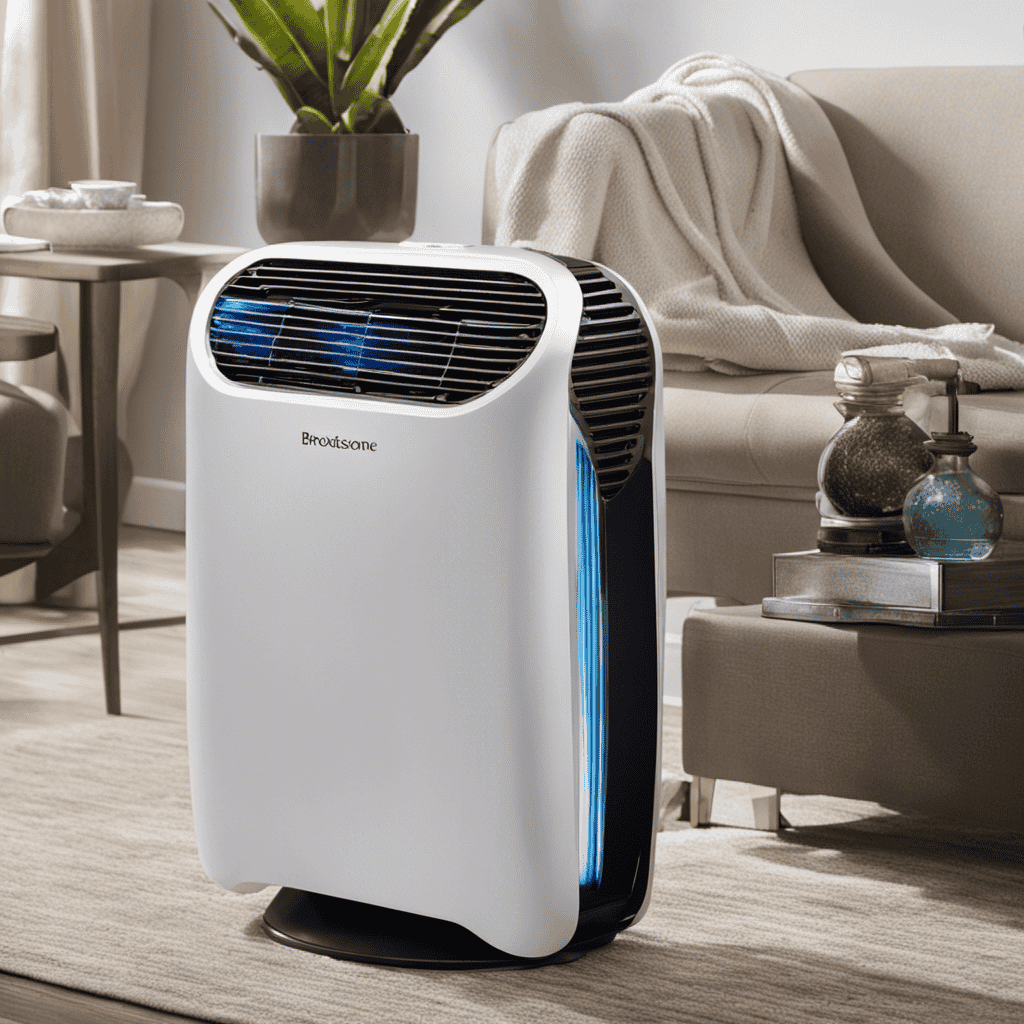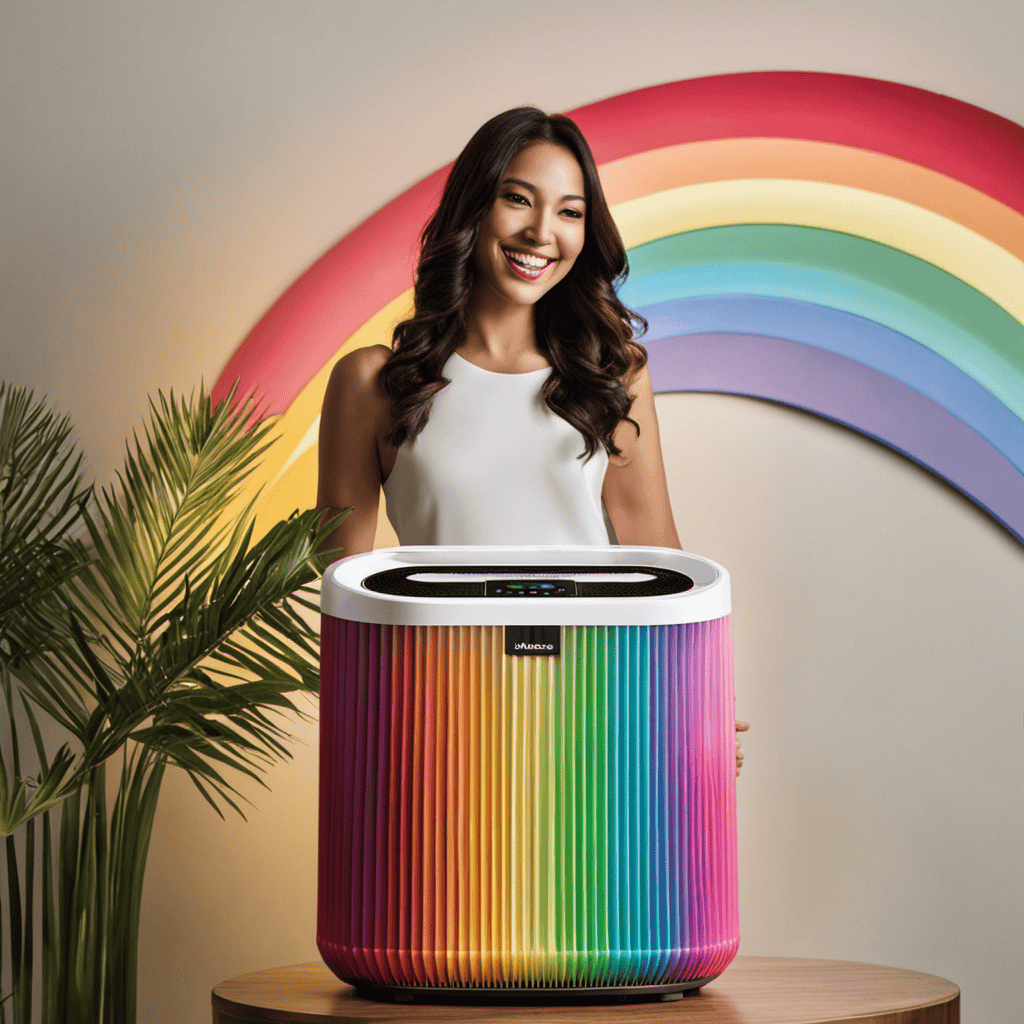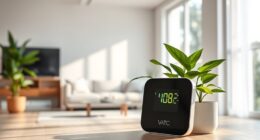You have purchased an air purifier for cleaner, healthier air in your home. But now you may be asking yourself, ‘How often should I use it?’ Don’t worry, I have the answers you need.
In this article, I’ll break down the factors to consider, recommend daily usage, discuss the effects of continuous usage, and even provide the best times to use your air purifier.
Get ready to breathe easy as we dive into the world of air purification.
Key Takeaways
- Recommended maintenance of specific air purifier model
- Recommended daily usage based on factors such as allergy symptoms, room size, air quality, and energy consumption
- Health benefits of using an air purifier, including reducing allergy symptoms, improving indoor air quality, and filtering out pollutants and allergens
- Best times to use an air purifier, such as during peak hours of pollution or when engaging in activities that generate indoor pollutants
Factors to Consider
When determining how frequently to use your air purifier, there are several factors you should consider.
One important factor is the recommended maintenance of your specific air purifier model. Different air purifiers have different requirements for cleaning or replacing filters, and adhering to these recommendations is crucial for optimal performance.
Another factor to consider is the noise levels of your air purifier. Some models can be quite loud, which may impact your overall comfort and ability to concentrate. If noise is a concern for you, it’s important to choose an air purifier that operates at a lower decibel level.
Recommended Daily Usage
When it comes to using an air purifier, understanding the optimal usage frequency is crucial for maximizing its effectiveness. It is important to consider factors such as the size of the room, the level of air pollution, and any specific health concerns.
Optimal Usage Frequency
To get the most out of your air purifier, you should determine the optimal usage frequency. Adjusting the usage based on allergies and considering the impact on energy consumption are crucial factors. Here are some points to consider:
-
Allergy Symptoms: Pay attention to the frequency and intensity of your allergy symptoms. If you notice a significant improvement when using the air purifier, it may be helpful to use it more often, especially during peak allergy seasons.
-
Room Size: Consider the size of the room where the air purifier is placed. For larger rooms, running the purifier for longer periods or using multiple units may be necessary to effectively clean the air.
-
Air Quality: Monitor the air quality in your home regularly. If you live in an area with high pollution levels or have indoor air quality issues, running the purifier more frequently can help maintain cleaner air.
-
Energy Consumption: Keep in mind that running the air purifier for extended periods can increase energy consumption. If you’re concerned about energy usage, try using the purifier on a lower fan speed or using a timer to control its operation.
Health Benefits of Usage
Using an air purifier regularly can have numerous health benefits, such as reducing allergy symptoms and improving indoor air quality. Air purifiers work by filtering out pollutants and allergens, ensuring that the air you breathe is clean and fresh. They can be particularly beneficial for individuals with respiratory conditions or allergies, as they help to remove common triggers like dust mites, pet dander, and pollen. However, it is important to be aware of the potential risks associated with air purifier usage. Some models may produce ozone, which can be harmful to your health if not properly managed. Additionally, regular maintenance and cleaning of your air purifier is essential to ensure its effectiveness. Here are some cleaning tips to keep in mind:
| Cleaning Tips |
|---|
| Regularly replace filters |
| Clean the exterior of the purifier |
| Vacuum the surrounding area |
| Follow manufacturer instructions for deep cleaning |
Effects of Continuous Usage
Continuous usage of an air purifier can lead to improved air quality in your home. By keeping the purifier on consistently, you can ensure that the air is constantly being filtered and purified. This can have several positive effects on your health and well-being.
-
Fresher air: With continuous usage, the air in your home will feel fresher and cleaner, as the purifier removes pollutants and allergens.
-
Reduced respiratory issues: By removing airborne particles, an air purifier can help alleviate symptoms of respiratory conditions like asthma or allergies.
-
Odor elimination: Continuous usage of an air purifier can help eliminate unpleasant odors, leaving your home smelling clean and fresh.
-
Dust reduction: The consistent operation of an air purifier can significantly reduce the amount of dust in your home, resulting in cleaner surfaces and less dust-related allergies.
However, it is important to be aware of potential risks and limitations associated with continuous usage. It’s recommended to follow the manufacturer’s instructions and replace filters regularly to maintain the effectiveness of the purifier.
Best Times to Use an Air Purifier
Now that we understand the effects of continuous usage, let’s discuss the best times to use an air purifier and the recommended daily usage.
To maximize the effectiveness of your air purifier, it is recommended to use it during times when the air quality is at its worst. This could be during peak hours of pollution, such as rush hour traffic or when nearby factories are releasing emissions. Additionally, using the air purifier during activities that can generate indoor pollutants, such as cooking or cleaning, can help maintain a healthier indoor environment.
However, it is important to note that running an air purifier 24/7 may not be necessary. Most experts suggest running the air purifier for a few hours each day, especially in rooms where you spend the most time. This can help reduce energy consumption and extend the lifespan of the purifier.
To summarize, using an air purifier strategically during times of poor air quality and for a few hours each day in frequently used rooms can provide optimal results.
| Best Times to Use an Air Purifier | Recommended Daily Usage |
|---|---|
| Peak hours of pollution | Few hours each day |
| During activities generating indoor pollutants |
Adjusting Usage Based on Air Quality
To ensure you’re breathing clean air, it’s important to adjust your air purifier usage based on current air quality levels. By monitoring air quality regularly, you can determine when to increase or decrease usage. Here are factors to consider when adjusting your schedule:
-
Outdoor pollution levels: If air quality outside is poor, it may be beneficial to run your air purifier on a higher setting for longer periods to filter out pollutants that entered your home.
-
Seasonal allergies: During allergy seasons, it’s advisable to use your air purifier more frequently to reduce the presence of allergens like pollen and dust.
-
Indoor activities: If you engage in activities that generate airborne particles, like cooking or cleaning, it’s a good idea to run the air purifier during and after these activities.
-
Occupancy levels: If there are more people in your home, it’s recommended to run the air purifier for longer periods to maintain clean air quality.
Overusing Vs Underusing: Finding the Balance
When it comes to using an air purifier, finding the optimal usage frequency is crucial to maintaining a healthy environment.
Overusing the air purifier may lead to unnecessary energy consumption, while underusing it may not effectively remove pollutants from the air.
It is important to strike a balance between the two to maximize the efficiency of the purifier and minimize potential health risks associated with poor air quality.
Optimal Usage Frequency
You should use your air purifier regularly to ensure optimal effectiveness. Continuous usage of your air purifier is key to maintaining clean and fresh air in your home. By using it consistently, you can effectively remove pollutants and allergens from the air, which can greatly improve the overall air quality.
Adjusting the air quality to suit your needs can be easily achieved by using your air purifier on a daily basis. Here are some benefits of using your air purifier regularly:
- Eliminates unpleasant odors, leaving your home smelling fresh and clean.
- Reduces the presence of airborne particles such as dust, pet dander, and pollen.
- Helps alleviate allergy symptoms and respiratory issues.
- Creates a healthier living environment by improving indoor air quality.
Potential Health Risks
Maintaining clean and fresh air in your home is essential for your health and well-being. While air purifiers are commonly used to improve indoor air quality, it is important to be aware of the potential dangers they may pose.
One of the main concerns is the release of ozone, a harmful gas that can irritate the respiratory system and worsen existing conditions such as asthma or allergies. Additionally, if not properly maintained, air purifiers can become breeding grounds for mold, bacteria, and other harmful particles, which can have long-term effects on your health.
Regularly cleaning and replacing filters, as well as following the manufacturer’s instructions, can help mitigate these risks and ensure that your air purifier is operating at its best.
Transitioning into the next section, let’s explore the importance of maintaining and cleaning your air purifier to maximize its effectiveness.
Maintaining and Cleaning Your Air Purifier
To keep your air purifier running efficiently, make sure to regularly clean and maintain it. This will help ensure that it continues to effectively remove airborne particles and improve the air quality in your home.
Here are some common maintenance issues and troubleshooting tips to help you keep your air purifier in top condition:
- Check and clean the pre-filter regularly to remove large particles and debris.
- Clean or replace the HEPA filter as recommended by the manufacturer to maintain optimal filtration.
- Clean the exterior of the air purifier regularly to remove dust and dirt that can accumulate.
- Ensure proper airflow by keeping the vents and intake grilles clear of obstructions.
Frequently Asked Questions
Can an Air Purifier Remove All Types of Air Pollutants?
Yes, an air purifier can remove many types of air pollutants. The filter effectiveness plays a crucial role in capturing common indoor air pollutants such as dust, pet dander, pollen, and some odors.
How Long Does It Take for an Air Purifier to Improve Indoor Air Quality?
Using my air purifier frequently ensures optimal air quality. Regular maintenance, such as changing filters, is crucial for its effectiveness. By keeping up with these tasks, I can trust my air purifier to improve indoor air quality efficiently.
Can an Air Purifier Prevent Allergies and Respiratory Issues?
Using an air purifier regularly can help prevent respiratory allergies and provide numerous benefits for those with asthma. It filters out allergens and pollutants, improving indoor air quality and reducing the risk of respiratory issues.
Are There Any Health Risks Associated With Using an Air Purifier for Extended Periods?
There are potential side effects and safety concerns associated with using an air purifier for extended periods. It’s important to be aware of these risks and take necessary precautions for your health.
Should I Use an Air Purifier in Every Room of My House or Just in Specific Areas?
Using an air purifier in high traffic areas helps to reduce the amount of airborne pollutants and allergens. Additionally, using one in bedrooms can improve sleep quality by removing dust and pet dander.
Conclusion
In conclusion, dear air purifier enthusiasts, the key to finding the perfect balance in using your air purifier lies in a delicate dance of knowledge, timing, and common sense.
While there are recommendations for daily usage, it ultimately depends on factors like air quality and personal preferences.
Remember, fellow clean air seekers, too much or too little can tip the scale of purification. So, embrace the art of adjusting, maintaining, and cleaning your trusty air purifier.
Let the dance of fresh air continue!










